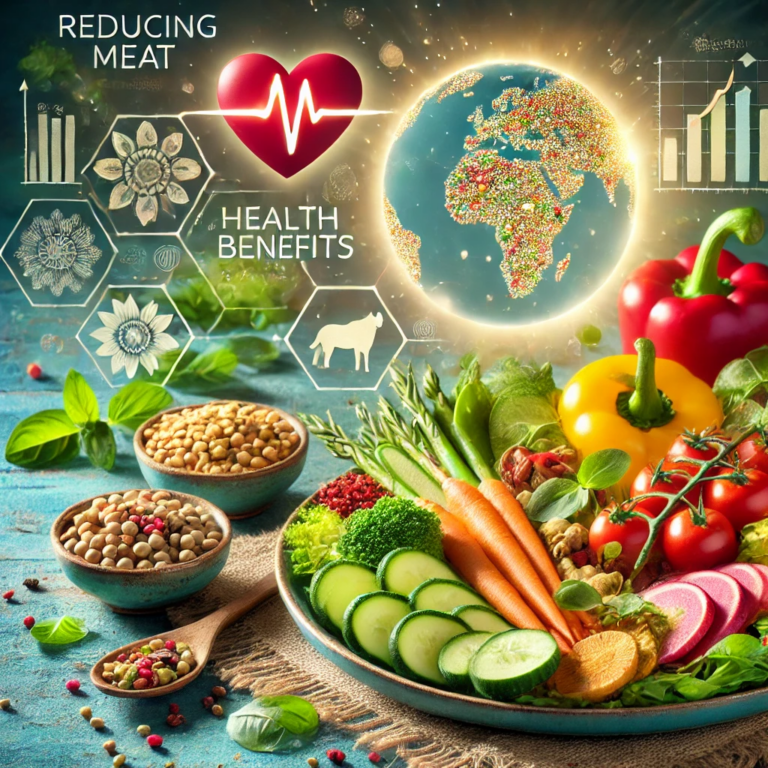5 Powerful Reasons to Reduce Meat Consumption for a Healthier Life
Why Reduce Meat Consumption?
Want to go vegetarian without the pressure? Learn easy, non-confrontational ways to eat less meat, stay healthy, and enjoy the journey with this practical guide.
Thinking about going vegetarian but unsure how to start? You’re not alone—many people want to reduce their meat consumption but feel overwhelmed by the process. The good news? It doesn’t have to be all-or-nothing!
This guide offers simple, non-confrontational ways to transition toward a vegetarian lifestyle. From easy meal swaps to tips for balanced nutrition, you’ll learn how to eat less meat and stay healthy—all at your own pace. Whether it’s for health, the planet, or just curiosity, every small step counts. Let’s dive in and make this transition approachable, fun, and delicious!
Health Benefits
Reducing meat consumption has been linked to numerous health benefits. Diets rich in plant-based foods, such as fruits, vegetables, legumes, and whole grains, are associated with lower risks of heart disease, hypertension, and type 2 diabetes. Eating less red and processed meat can also help reduce cholesterol levels and inflammation, promoting overall cardiovascular health. Additionally, plant-based diets are often higher in fiber, which improves digestion and supports a healthy gut microbiome. While meat can provide protein and essential nutrients, these benefits can often be achieved through plant-based alternatives, offering a more balanced and nutrient-dense way to support long-term health.
Environmental Impact
Eating less meat is one of the most effective ways individuals can reduce their environmental footprint. Livestock farming is a significant contributor to greenhouse gas emissions, deforestation, and water pollution. For example, raising cattle requires large amounts of land and water and produces methane, a potent greenhouse gas. By choosing plant-based meals more often, you can help conserve resources and reduce your contribution to climate change. Even small reductions in meat consumption, like participating in “Meatless Mondays,” can add up to meaningful environmental benefits over time.
Ethical Reasons
Many people choose to eat less meat due to concerns about animal welfare. The industrial farming system often raises animals in overcrowded and inhumane conditions, subjecting them to unnecessary suffering. By reducing meat consumption, individuals can help reduce the demand for factory farming and encourage more ethical treatment of animals. Supporting plant-based or humane farming practices demonstrates compassion and aligns with a commitment to minimizing harm to living creatures. Even small steps, such as choosing meat-free meals a few times a week, can contribute to a shift toward more ethical food systems.
Flexibility Is Key
You don’t have to become fully vegetarian or vegan to make a difference; even part-time changes can have a significant impact. Flexitarianism, a diet that prioritizes plant-based meals while occasionally including meat, is a practical and flexible approach. It allows individuals to enjoy their favorite dishes without feeling restricted while still reducing their meat intake. For instance, you might swap meat for plant-based protein in a few meals each week or reserve meat for special occasions. Small, consistent changes are sustainable and can inspire others to follow suit, collectively amplifying the positive effects on health, ethics, and the environment. Every effort counts, and embracing a flexible mindset makes the transition easier and more enjoyable.
Choosing to eat less meat is a powerful step toward better health, a kinder world, and a greener planet—but it doesn’t have to feel overwhelming or restrictive. In this first part of our series, we’ve explored the many benefits of reducing meat consumption and how even small, flexible changes can make a meaningful impact. The best part? You don’t have to be perfect or give up your favorite meals entirely to start making a difference.
If you’re ready to learn more, stay tuned for the next installment in “A Non-Confrontational Guide to Going Vegetarian”! We’ll dive deeper into easy, practical tips for meal planning, discovering plant-based flavors, and navigating social situations while staying true to your goals. Subscribe now so you don’t miss a single insight—it’s your guide to a healthier, more sustainable lifestyle, one bite at a time!

